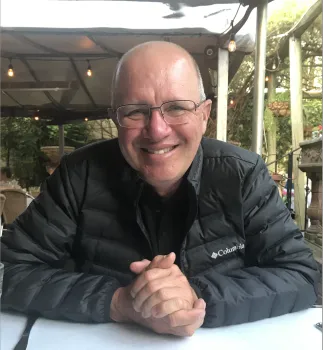
Kenneth W. Tate, UC Cooperative Extension specialist and professor in the UC Davis Department of Plant Sciences, died unexpectedly on June 5 while traveling in Oregon. He was 58.
Born in Newark, California, and raised in Norman, Oklahoma, Tate joined UC in 1995, after earning a Ph.D. in water resources, a master’s degree in range ecology and management, and a bachelor’s degree in in range ecology and management from Oklahoma State University. He also held an associate’s degree in range management from Northeastern Oklahoma A&M College in Miami, Oklahoma.
Over his 30-year career, Tate emerged as a leading figure in rangeland science and management, tackling a wide range of agricultural and environmental challenges across California’s 30-plus million acres of rangelands. He built and led many successful teams to study how management practices affect key ecosystem functions and health — from individual plots to entire ranches and watersheds – and sought ways to enhance conservation outcomes and agricultural benefits, including ranch productivity and profitability.
“Ken was one of those rare individuals who was able to combine cutting-edge science and practical application,” said his friend and colleague Dan Macon, UC Cooperative Extension livestock and natural resources advisor. “He could help ranchers understand the science behind their management. And he could translate that on-the-ground knowledge into policy.”
Informing water quality management and policy
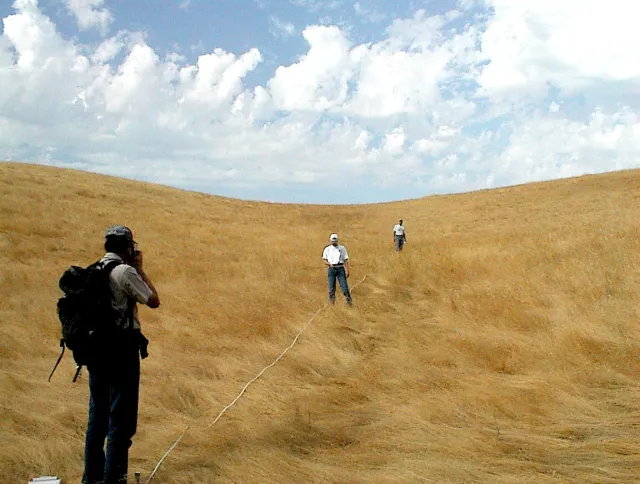
Bay Area rancher Tim Koopmann has applied Tate’s research into his own management strategies. “I was able to observe Dr. Tate as he studied nutrient loading and E. coli studies in the irrigated lands of the Bridgeport Valley in the eastern Sierra to the fecal pathogen research on leafy green produce in the Salinas Valley,” he said. “Ken provided practical science to reach applicable solutions.”
Koopmann met Tate in 1998, after the San Francisco Public Utilities Commission announced plans to eliminate managed livestock grazing on a 40,000-acre watershed out of concern that Cryptosporidium parvum, a potential pathogen from cow manure, could contaminate drinking water supplies.
In response, Tate conducted research on cattle and local wildlife in collaboration with UCCE specialist Rob Atwill, UCCE livestock advisor Sheila Barry, the USDA Natural Resources Conservation Service, the Alameda County Resource Conservation District and local ranchers.
“The resulting data collected and analyzed provided an improved management strategy, while maintaining the use of managed grazing for fire fuel load reduction, habitat enhancement and noxious and invasive plant control,” said Koopmann of the study.
Contributions to range management
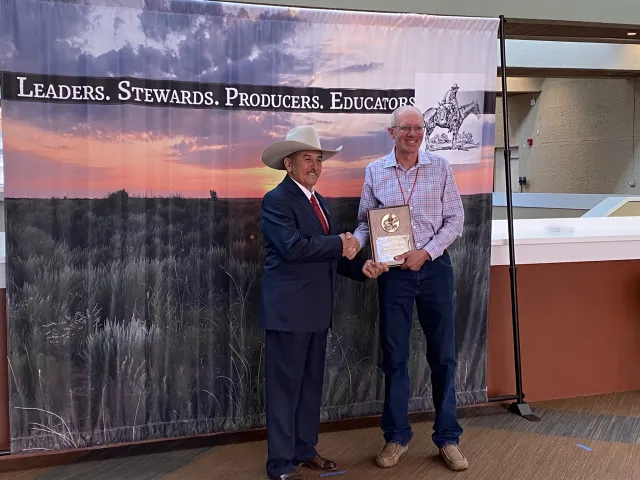
Tate earned frequent recognition for his impactful work, outstanding scholarship and deep commitment to the stewardship of rangelands and the people who live and work on the land. He had become a trusted source of information through his work with ranchers, public land managers, conservation groups, regulatory agency staff and policymakers to support science-based decision-making.
In 2022, Tate was honored by the Society for Range Management, which presented him with its W.R. Chapline Land Stewardship Award for exceptional accomplishments and contributions to the art and science of range management through rangeland stewardship.
The Chapline award recognized Tate for his visionary leadership on a number of collaborative projects examining the fate and transport of microbial and chemical contaminants, including pathogenic protozoa such as Giardia duodenalis, Microsporidia, and Toxoplasma gondii; pathogenic bacteria such as shigatoxin-producing E. coli, Salmonella, Campylobacter; bacterial indicators of water quality such as fecal coliforms and Enterococci; and hormones and pharmaceutical products common in rangeland cattle production.
His work produced a comprehensive scientific framework for understanding the prevalence, transport and fate of pollutants – as well as a management framework to guide the implementation of grazing management practices to maintain and protect clean water.
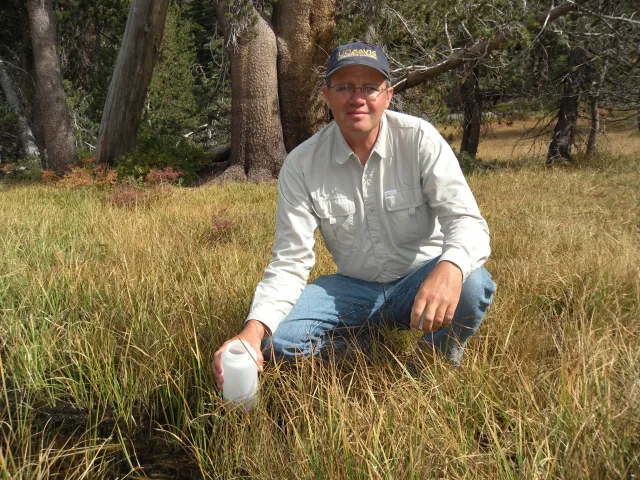
Inaugural Russell L. Rustici Endowed Chair in Rangeland Watershed Science
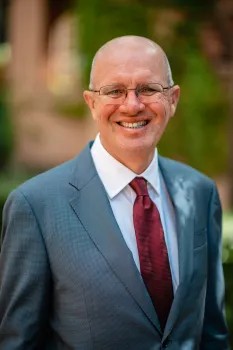
Tate’s impactful work and ability to connect with people from different backgrounds were recognized early by many colleagues and ranching partners. In 2009, he was named the inaugural Russell L. Rustici Endowed Specialist in Rangeland Watershed Sciences. The endowment, created by the late Russell Rustici—a Lake County cattle rancher—was established to support collaborative leadership and science-based, practical solutions to protect and enhance California’s rangelands. Tate exemplified Rustici’s vision, earning his respect early in his career and becoming a key leader in a multidisciplinary team addressing critical rangeland challenges across the state.
Over the years, Tate used the endowment funds to advance applied research with real-world impact, expand and create new platforms to share this work more widely, and support the next generation of young professionals. In 2012, Tate launched the UC Rustici Rangeland Science Symposium, a biennial event that brings together 200 to 400 science, management and policy leaders to drive meaningful change on California's rangelands.
Dealing with drought
During California’s historic 2012-2016 drought, Tate once again showed his strong dedication to the ranching community, abandoning his sabbatical plans to help ranchers who were struggling with extreme drought conditions. Working with the U.S. Drought Monitor Group, the State of California and the ranching community, he developed the 2014 “Ranching and California’s Drought Workshop and Webcast,” which included participants at the UC Davis campus and 16 webcast locations in rural communities across California. Participants discussed state and federal drought declarations, ranchers’ experiences and feeding strategies for livestock in a drought.
Rick Roberti, California Cattlemen's Association president and a rancher in Plumas County, collaborated with Tate for more than 20 years.
“His legacy is going on for generations up here in the Sierra Valley,” Roberti said. “He knew how to draw out people who wouldn’t work with the government. People ended up working with Ken because he proved to be an honest man.”
Collaborating with Australians
Tate’s scientific leadership and expertise in the livestock grazing-environmental quality-human health nexus was also regularly sought out nationally and internationally.
He worked with collaborators at Central Queensland University to establish partnerships on research and stakeholder outreach to address livestock-related water-quality impairments contributing to the decline of the Great Barrier Reef ecosystem.
In recognition of this work, he was selected for the 2022 Australian American Fulbright Scholar Program.
Monitoring wolves on ranches
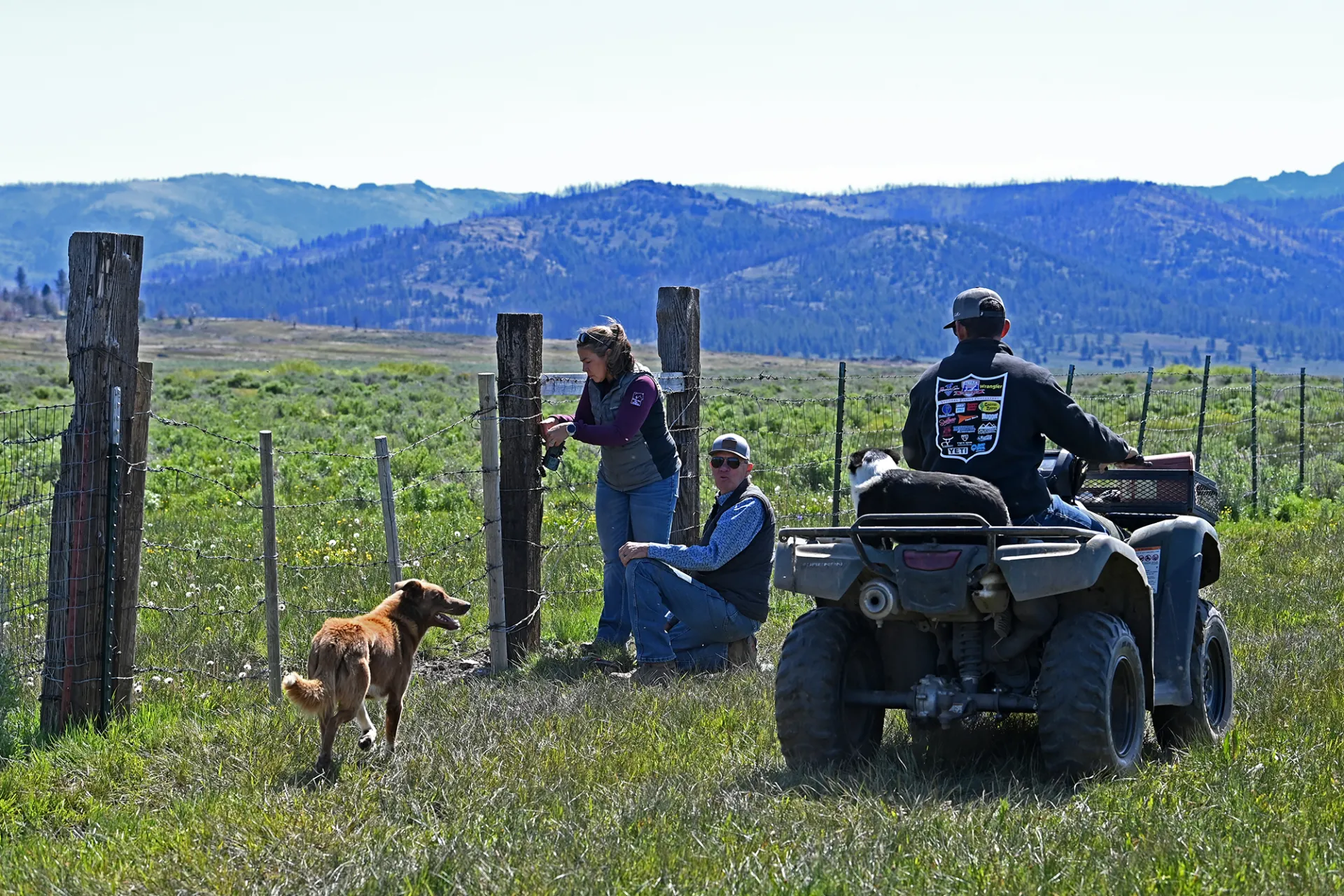
When taking on tough subjects including water quality, grazing and wolves, Tate encouraged ranchers, saying, “This isn’t going to be fast or easy, but I think we can get it done,” Roberti recalled.
As the protected gray wolf population began expanding from Oregon into Northern California, ranchers feared they would prey on cattle. UC Cooperative Extension agricultural economics specialist Tina Saitone and Tate, her husband, launched a project to quantify the indirect costs of wolf predation on cattle.
For the last couple of years, Tate and Saitone have been in the field conducting a comprehensive study to determine the costs that wolves are having on range cattle operations in Northern California. Early results suggest that one wolf can cost ranchers up to $162,000.
“Through DNA work they’ve helped identify which wolves are here and from which pack. Ken knew all this data would help us down the road,” Roberti said. “He was working for the ranchers and people in the country and I’ll be eternally grateful.”
On Facebook, agricultural organizations posted tributes to Tate. The California Rangeland Trust wrote: “Dr. Tate’s legacy spans far beyond his groundbreaking research. His collaborative spirit and deep respect for working landscapes left an indelible mark on California’s rangelands, and on all of us privileged to work alongside him. In 2016, the Rangeland Trust honored Dr. Tate with the Conservation Impact Award for his lifelong commitment to the stewardship of natural resources and the ranching families who care for them.”
The California Cattlemen's Association wrote: “CCA is deeply saddened by the loss of Dr. Ken Tate, a great leader and friend. His legacy and the impact of his research reach throughout many ranches, streams and pastures across California – and will continue to do so for many generations.”
Mentoring early-career scientists
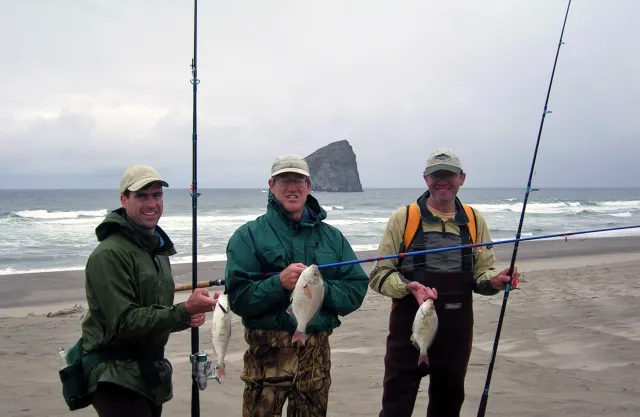
In addition to his research and extension, Tate also mentored more than 50 graduate students, postdocs and researchers, and provided laboratory and field internship opportunities for more than 100 undergraduate students. Many of his mentees are now leaders in rangeland conservation and management.
UC Cooperative Extension Specialist Leslie Roche was among the students and researchers who studied under Tate.
“Ken was my mentor and constant advocate throughout my graduate and postdoctoral studies," Roche said. "He was a tireless champion for working rangelands and the ranching community, always leading with integrity and dedication to science-based, practical solutions. Ken’s kindness, humility, and incredible ability to connect with people left a lasting impact on everyone who knew him."
Roche and David Lewis, UCCE watershed management advisor in the North Bay, have set up an online tribute page for those who wish to share memories and photographs in honor of Tate’s life and work: https://www.online-tribute.com/KennethWTate.
Tate is survived by wife Tina Saitone, daughter Neri, mother Carolyn, sister Pamela, nephews Nathan, Noah and Johnathan and extended family members.
A celebration of Tate’s life is being planned and will be open to colleagues and friends. Details will be shared as they become available.

